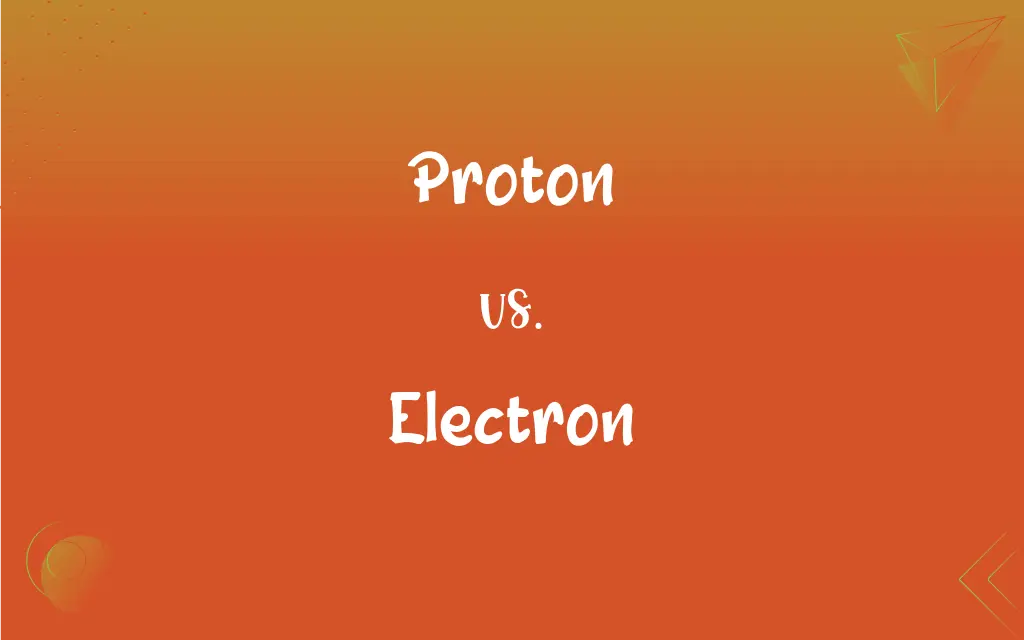Proton vs. Electron: What's the Difference?
Edited by Aimie Carlson || By Janet White || Published on December 20, 2023
Protons are positively charged particles in an atom's nucleus, while electrons are negatively charged particles orbiting the nucleus.

Key Differences
Protons, found in the nucleus of an atom, carry a positive charge and contribute significantly to an atom's mass. Electrons, in contrast, are negatively charged particles that orbit the nucleus at various energy levels. This fundamental charge difference is crucial for atomic stability and chemical reactions.
The mass of a proton is approximately 1836 times that of an electron, making protons much heavier and more central to determining an atom's identity. Electrons, while much lighter, play a key role in determining an atom's chemical properties and interactions, due to their arrangement in shells around the nucleus.
In terms of contribution to atomic structure, protons define the atomic number and hence the element itself. Electrons, however, are involved in bond formation and chemical reactions, as they can be shared, lost, or gained in chemical processes.
The interaction between protons and electrons is fundamental to atomic stability; protons attract electrons due to opposite charges, maintaining the atom's overall neutrality when the number of protons equals the number of electrons. Electrons, due to their mobility, are responsible for electrical conductivity and the formation of ions.
In nuclear reactions, protons are directly involved, as changes in their number can transform one element into another. Electrons, though not directly involved in nuclear reactions, affect the atom's charge and chemical behavior when they are added or removed, leading to the formation of ions.
ADVERTISEMENT
Comparison Chart
Charge
Positively charged
Negatively charged
Location in Atom
In the nucleus
Orbiting the nucleus
Mass
Approximately 1836 times heavier than electrons
Much lighter than protons
Role in Atomic Identity
Determines the atomic number
Influences chemical properties
Behavior in Reactions
Involved in nuclear reactions
Involved in chemical reactions
ADVERTISEMENT
Proton and Electron Definitions
Proton
Protons contribute to the mass and charge of atoms.
The balance between protons and electrons defines an atom's net charge.
Electron
An electron is a negatively charged subatomic particle.
Electrons orbit the nucleus, balancing the positive charge of protons.
Proton
A proton is a subatomic particle with a positive charge.
The number of protons in an atom's nucleus determines its element.
Electron
Electrons have negligible mass compared to protons.
The mass of an electron is so small that it is often considered negligible in calculations of atomic mass.
Proton
Protons play a key role in nuclear chemistry.
In nuclear fusion, protons can combine to form heavier elements.
Electron
Electrons occupy various energy levels around an atom's nucleus.
The chemical properties of an atom are determined by the arrangement of its electrons.
Proton
Protons are stable subatomic particles.
In a hydrogen atom, the single proton in the nucleus is its defining feature.
Electron
Electrons are involved in forming chemical bonds.
In a water molecule, electrons are shared between hydrogen and oxygen atoms.
Proton
Protons are fundamental components of all atomic nuclei.
The helium atom contains two protons in its nucleus.
Electron
Electrons can be transferred or shared between atoms.
In salt, sodium donates an electron to chlorine, forming an ionic bond.
Proton
The stable, positively charged nucleon, having a mass 1,836 times that of an electron and being a baryon composed of two up quarks and one down quark. The proton is a basic component of all atomic nuclei and the nucleus of the protium isotope of hydrogen.
Electron
(particle) The subatomic particle having a negative charge and orbiting the nucleus; the flow of electrons in a conductor constitutes electricity.
Proton
(particle) A positively charged subatomic particle forming part of the nucleus of an atom and determining the atomic number of an element, composed of two up quarks and a down quark.
Proton
The atomic nucleus of protium hydrogen-1}}
Proton
Synonym of primordium
Proton
A stable particle with positive charge equal to the negative charge of an electron
FAQs
What is a proton?
A proton is a positively charged subatomic particle in an atom's nucleus.
How does the mass of a proton compare to an electron?
A proton is about 1836 times heavier than an electron.
Do protons determine an atom's element?
Yes, the number of protons in an atom's nucleus defines its element.
Where are protons located in an atom?
Protons are located in the nucleus of an atom.
Are protons heavier than electrons?
Yes, protons are significantly heavier than electrons.
What role do electrons play in chemistry?
Electrons are crucial for chemical reactions and bond formation.
Can the number of protons in an atom change?
In normal chemical reactions, no, but in nuclear reactions, the number of protons can change, altering the element.
Can electrons move between atoms?
Yes, electrons can be transferred or shared between atoms in chemical reactions.
Are protons and electrons always paired in numbers?
In a neutral atom, yes, the number of protons and electrons is the same.
What is an electron?
An electron is a negatively charged subatomic particle orbiting an atom's nucleus.
What is the charge of an electron?
An electron has a negative charge.
Where do electrons reside in an atom?
Electrons orbit the nucleus of an atom.
What is the charge of a proton?
A proton has a positive charge.
Is the number of protons in an atom ever equal to the number of electrons?
In a neutral atom, the number of protons equals the number of electrons.
Are protons stable particles?
Yes, protons are generally stable within the atomic nucleus.
Can the number of electrons in an atom change?
Yes, atoms can gain or lose electrons during chemical reactions.
Does the arrangement of electrons affect an atom's chemical properties?
Yes, the arrangement and number of electrons determine an atom's chemical properties.
Do electrons contribute significantly to an atom's mass?
No, electrons have a negligible mass compared to protons and neutrons.
What happens if an atom loses or gains electrons?
It becomes an ion, either positively or negatively charged.
Do electrons participate in nuclear reactions?
No, electrons do not participate in nuclear reactions, which involve the atomic nucleus.
About Author
Written by
Janet WhiteJanet White has been an esteemed writer and blogger for Difference Wiki. Holding a Master's degree in Science and Medical Journalism from the prestigious Boston University, she has consistently demonstrated her expertise and passion for her field. When she's not immersed in her work, Janet relishes her time exercising, delving into a good book, and cherishing moments with friends and family.
Edited by
Aimie CarlsonAimie Carlson, holding a master's degree in English literature, is a fervent English language enthusiast. She lends her writing talents to Difference Wiki, a prominent website that specializes in comparisons, offering readers insightful analyses that both captivate and inform.







































































